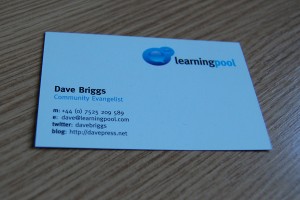Get posts sent to your inbox:
Bookmarks for March 30th through April 5th
I find this stuff so that you don’t have to.
- The Collapse of Complex Business Models « Clay Shirky – Awesome stuff from Shirky.
- Reflecting on my MSc research by Michele Ide-Smith – "By researching the attitudes and perceptions of authorities and citizens I hope to gain a better understanding of perceived barriers, threats and opportunities of using social media for community engagement"
- Cinch – "Cinch is a free and easy way to create and share audio, text and photo updates using your phone or computer. Cinch enables you to capture and report on your experiences in a way that simple text just can't do. Using a simple interface, you can make and broadcast your content creations through Facebook, Twitter, CinchCast.com and more."
- The State of the Internet Operating System – O’Reilly Radar – "Ask yourself for a moment, what is the operating system of a Google or Bing search? What is the operating system of a mobile phone call? What is the operating system of maps and directions on your phone? What is the operating system of a tweet?"
- Penval’s Digital Inclusion Manifesto – Well done Paul Nash. This is what the digital inclusion debate needs – proper, thought through ideas. Genuinely constructive contributions. Not just people bleating about the problems.
- tecosystems » Forking, The Future of Open Source, and Github – Is the future of open source going to be based on communities such as Apache and Eclipse or will it be based on companies that sell open source? Neither.
- Dr Dennis Kimbro & his views on recruitment – Really interesting and thought provoking piece on talent management, and attitudes to it, in local government.
- In quest of simplicty – "We expect IT to be complex and costly, but the lesson of the past 5 years in IT – where we’ve seen the consumerization of enterprise IT (“enterprise” is often a coy way of saying “this has to be complex and expensive – no questions!”) – is that IT can be both simple and cheap."
- Law and social media – dull but important – "Social media throws up issues of privacy and identity which are far more complex when you have a complete record of someone’s time online and a also a need to balance the personal with the professional roles of an individual. "
- Powerful petitions with real teeth set to bite – "Local people can now demand their councils take action on underperforming schools and hospitals, drink disorder, anti-social behaviour and other concerns under new rules giving real power to local petitions, announced Communities Secretary John Denham today."
You can find all my bookmarks on Delicious. There is also even more stuff on my shared Google Reader page.
You can also see all the videos I think are worth watching at my video scrapbook.

 My role at
My role at 

